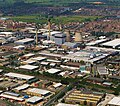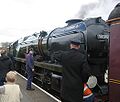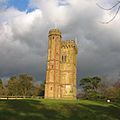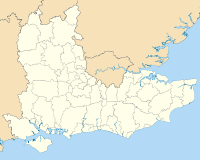Portal:South East England
The South East England Portal

South East England is one of the nine official regions of England in the United Kingdom at the first level of ITL for statistical purposes. It consists of the nine counties of Berkshire, Buckinghamshire, East Sussex, Hampshire, the Isle of Wight, Kent, Oxfordshire, Surrey and West Sussex. Cities and towns in the region include Aldershot, Ashford, Aylesbury, Basingstoke, Bracknell, Brighton and Hove, Canterbury, Chichester, Crawley, Eastbourne, Farnborough, Gosport, Guildford, Hastings, High Wycombe, Margate, Maidstone, Medway, Milton Keynes, Newport, Oxford, Portsmouth, Ramsgate, Reading, Slough, Southampton, Winchester, Woking and Worthing.
South East England is the third-largest region of England, with a land area of 19,072 square kilometres (7,364 sq mi), and is also the most populous with a total population of 9,379,833 in 2022. The region contains eight legally chartered cities: Brighton and Hove, Canterbury, Chichester, Milton Keynes, Oxford, Portsmouth, Southampton and Winchester. The region's close proximity to London has led to South East England becoming a prosperous economic hub with the largest economy of any region in the UK, after London. The region is home to Gatwick Airport, the UK's second-busiest airport, and Heathrow Airport (the UK's busiest airport) is located adjacent to the region's boundary with Greater London. The coastline along the English Channel provides numerous ferry crossings to mainland Europe.
The region is known for its countryside, which includes two national parks: the New Forest and the South Downs, as well as the North Downs, the Chiltern Hills and part of the Cotswolds. The River Thames flows through the region and its basin is known as the Thames Valley. It is also the location of a number of internationally known places of interest, such as HMS Victory in Portsmouth, Cliveden in Buckinghamshire, Thorpe Park and RHS Wisley in Surrey, Blenheim Palace in Oxfordshire, Windsor Castle in Berkshire, Leeds Castle, the White Cliffs of Dover and Canterbury Cathedral in Kent, Brighton Palace Pier, and Hammerwood Park in East Sussex, and Wakehurst Place in West Sussex. The region has many universities; the University of Oxford is the oldest in the English-speaking world, and ranked among the best in the world.
South East England is host to various sporting events, including the annual Henley Royal Regatta, Royal Ascot and The Derby, and sporting venues include Wentworth Golf Club and Brands Hatch. Some of the events of the 2012 Summer Olympics were held in the south east, including the rowing at Eton Dorney and part of the cycling road race in the Surrey Hills.
In medieval times, South East England included much of the Kingdom of Wessex, which was the precursor to the modern state of England. Winchester was the capital of England after unification of the various states, including the kingdoms of Kent, Sussex and Mercia. Winchester stopped being the administrative capital of England some time in the 13th century as its influence waned while the City of London dominated commerce. The last monarch to be crowned at Winchester was Richard II in 1377, although the last monarch to be crowned by the Bishop of Winchester was Queen Mary I in 1553. (Full article...)
Selected article

Brighton and Hove (/ˈbraɪtən ... ˈhoʊv/ BRY-tən … HOHV) is a city and unitary authority area, ceremonially in East Sussex, England. There are multiple villages alongside the seaside resorts of Brighton and Hove in the district. It is administered by Brighton and Hove City Council, which is currently under Labour majority control.
The two resorts, along with Worthing and Littlehampton in West Sussex, make up the second most-populous built-up area of South East England, after South Hampshire. In 2014, Brighton and Hove City Council and other nearby councils formed the Greater Brighton City Region local enterprise partnership area. (Full article...)
Selected pictures
Selected biography
Sir Frederick Alfred Laker (6 August 1922 – 9 February 2006) was an English airline entrepreneur, best known for founding Laker Airways in 1966, which went bankrupt in 1982. Known as Freddie Laker, he was one of the first airline owners to adopt the "low cost / no-frills" airline business model that has since proven to be successful worldwide when employed by companies such as Ryanair, Southwest Airlines, easyJet, Norwegian Air, and AirAsia. (Full article...)
On This Day in South East England
7 October:
- 1713: Army officer Granville Elliott was born in Barnes which was then part of Surrey.
- 1927: Actor Tony Beckley was born in Southampton.
- 1928: Psychiatrist Lorna Wing was born in Gillingham, Kent.
- 1983: Journalist Archie Bland was born in Abbots Worthy, Hampshire.
Categories
Related portals
WikiProjects
Topics
Associated Wikimedia
The following Wikimedia Foundation sister projects provide more on this subject:
-
Commons
Free media repository -
Wikibooks
Free textbooks and manuals -
Wikidata
Free knowledge base -
Wikinews
Free-content news -
Wikiquote
Collection of quotations -
Wikisource
Free-content library -
Wikiversity
Free learning tools -
Wikivoyage
Free travel guide -
Wiktionary
Dictionary and thesaurus































































































































